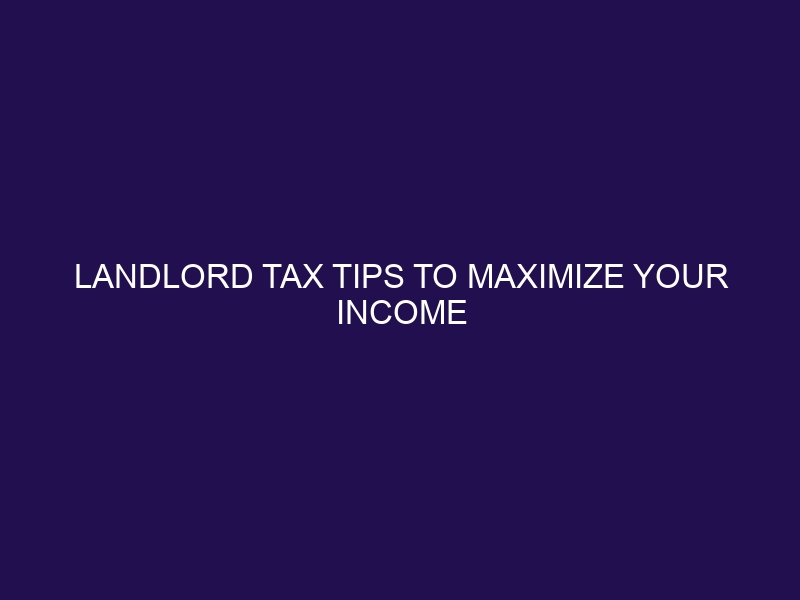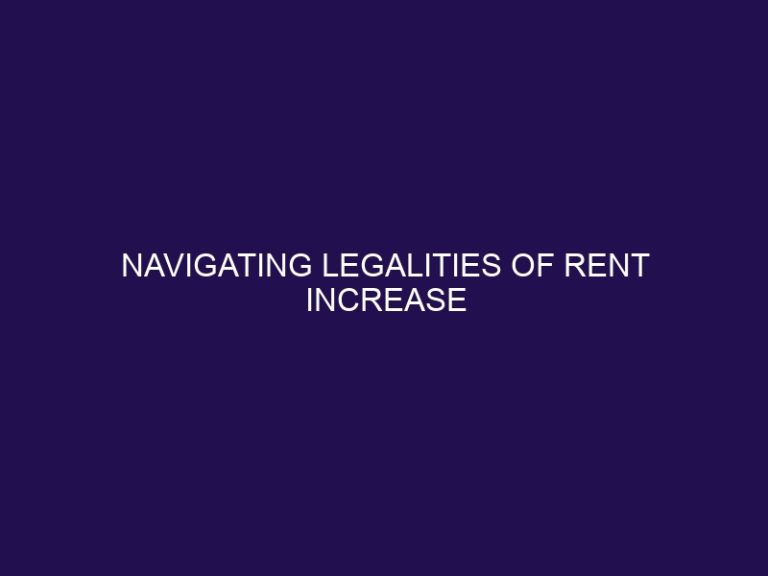Landlord Tax Tips to Maximize Your Income
Introduction to Landlord Taxes
Being a landlord can be a lucrative investment opportunity, but it also comes with its share of responsibilities, including taxes. Landlord taxes are different from personal income taxes and can be complex to navigate. However, understanding the basics and following some essential tips can help you maximize your income and avoid potential pitfalls.
Rental income is any money you receive from renting out a property. This includes rent payments, security deposits, pet fees, parking fees, and any other income associated with the rental property. What qualifies as rental income may vary, so it’s essential to consult with a tax professional or refer to the IRS guidelines.
Rental income tax applies to all types of properties, including residential, vacation rentals, commercial, and even vacant land. Any income earned from these properties is subject to taxation.
When reporting rental income on your tax return, you will need to fill out Schedule E (Form 1040) and include it with your personal tax return. This form will help you determine your total rental income, expenses, and net profit or loss from the rental property.
There are several deductions that landlords can take advantage of to reduce their tax liability, such as mortgage interest, property taxes, repairs and maintenance, insurance, and utilities. Additionally, landlords can also claim a depreciation deduction for the gradual wear and tear of the property over time.
Tax Tips for Landlords to Maximize Income
- Keep Detailed Records: It’s essential to keep track of all rental income and expenses, including receipts, invoices, and bank statements. This will help you accurately report your taxes and provide evidence in case of an audit.
- Take Advantage of Tax Deductions: Be aware of all the deductions you can claim and make sure to keep track of them throughout the year. This can help reduce your taxable income.
- Consider Forming an LLC: Consider forming a Limited Liability Company (LLC) to protect your personal assets and take advantage of certain tax benefits.
- Hire a Professional Accountant: Tax laws and regulations can be complex, and hiring a professional accountant can help ensure that you are filing your taxes correctly and taking advantage of all eligible deductions.
Common Mistakes to Avoid When Filing Landlord Taxes
- Not Reporting All Rental Income: It’s essential to report all rental income, even if you receive it in cash. Failure to report all income can result in penalties and interest.
- Not Keeping Track of Expenses: Keeping detailed records of expenses is crucial for accurately reporting your taxes and reducing your taxable income.
- Not Properly Calculating Depreciation: Depreciation can be a complicated calculation, and it’s essential to use the correct method and depreciation rate for your property.
- Not Filing on Time: It’s crucial to file your taxes on time to avoid penalties and interest. If you are unable to file by the deadline, make sure to file for an extension.
In conclusion, understanding landlord taxes and following these tips can help maximize your income and avoid potential mistakes when filing your taxes. It’s always recommended to consult with a tax professional for individualized advice based on your specific situation.
What is Considered Rental Income?
Rental income refers to any payments received for the occupation of a property, including rent, advance rent, expenses paid by the tenant, and lease cancellation payments. It also encompasses income from renting out a portion of the property, such as a parking space or garage.
So, what exactly is considered rental income? Let’s take a closer look.
What Types of Properties Are Subject to Rental Income Tax?
Properties subject to rental income tax include:
- residential and commercial real estate
- vacation properties
- land leased for income generation
It is important to understand these property types in order to accurately report and comply with tax regulations.
What Qualifies as Rental Income?
Rental income includes any payments received for the use of property, such as rent, advance rent, expenses paid by the tenant, and security deposits retained. It also covers any services or property received in exchange for rent, making it a comprehensive category for determining what qualifies as rental income.
How to Report Rental Income on Your Tax Return
- Keep Records: Document all rental income and expenses.
- IRS Form 1040: Use Schedule E to report rental income.
- Expenses Deduction: Include mortgage interest, property tax, and repairs.
- Depreciation: Account for property depreciation.
Reporting rental income correctly is crucial to avoid tax penalties.
What Forms Do You Need to File for Rental Income?
When filing for rental income, it is important to have the necessary forms on hand. These typically include:
- Schedule E (Form 1040) for reporting rental income and expenses.
- Form 4562 for reporting depreciation.
- Form 8825 for reporting rental income from real estate.
Seeking advice from a tax professional can also help ensure accuracy in the filing process.
What Expenses Can You Deduct from Rental Income?
Expenses that can be deducted from rental income include:
- mortgage interest
- property taxes
- insurance
- maintenance
- utilities
- depreciation
In addition, expenses for:
- advertising
- property management
- legal fees
- repairs
are also eligible for deduction, resulting in a reduction of the taxable rental income.
How to Calculate Depreciation on Rental Property?
- Determine the basis of the property, including the purchase price, settlement fees, and other acquisition costs.
- Divide the basis by the useful life of the property to calculate the yearly depreciation.
- Report the depreciation on your tax return using the appropriate IRS form.
In a similar scenario, a property investor successfully calculated the depreciation on their rental property, maximizing tax benefits while also ensuring compliance with regulations.
Tax Tips for Landlords to Maximize Income
As a landlord, it is important to not only generate income from your rental properties, but also to maximize your earnings through strategic tax planning. In this section, we will discuss four key tax tips that can help you increase your income as a landlord. From keeping detailed records to hiring a professional accountant, these tips will provide valuable insights on how to make the most of your rental property investments. Let’s dive into the world of landlord taxes and discover how you can maximize your earnings.
1. Keep Detailed Records
- Maintain receipts for property expenses.
- Record rental income and expenses systematically.
- Keep a separate bank account for rental income and expenses.
- Document repairs, improvements, and maintenance.
- File and organize tax-related documents annually.
By following these steps, landlords can ensure detailed record-keeping and streamline the process of filing taxes effectively.
2. Take Advantage of Tax Deductions
- Keep receipts for expenses like repairs and maintenance.
- Take advantage of deductions for mortgage interest, property taxes, and operating expenses.
- Claim deductions for travel, insurance, and legal fees related to rental activities.
3. Consider Forming an LLC
- Research the legal requirements and benefits of forming an LLC.
- Consult with a legal or financial advisor to understand the tax implications of establishing an LLC.
- Prepare and file the necessary paperwork to form the LLC.
- Adhere to ongoing compliance requirements for the LLC.
4. Hire a Professional Accountant
- Research Accountant Options: Look for certified professionals with experience in landlord taxes.
- Check 4. Hire a Professional Accountant
Common Mistakes to Avoid When Filing Landlord Taxes
As a landlord, it is important to understand the tax implications of your rental income. However, many landlords make common mistakes when filing their taxes, which can lead to financial consequences. In this section, we will discuss the most common mistakes to avoid when filing landlord taxes. From failing to report all rental income to not filing on time, we will cover the key errors that landlords should be aware of to maximize their income and avoid penalties.
1. Not Reporting All Rental Income
- Keep meticulous records of all rental income sources, including subletting and incidental earnings.
- Utilize software or spreadsheets to track income accurately.
- Regularly reconcile bank statements to ensure that no income goes unreported.
According to the IRS, failure to report all rental income can result in penalties and interest on unpaid taxes.
2. Not Keeping Track of Expenses
- Utilize accounting software to accurately track all expenses.
- Maintain organized receipts and invoices for easy reference.
- Regularly update financial records to capture all expenses.
Keeping track of expenses is crucial for maximizing tax deductions and ensuring financial transparency. It is important to avoid not keeping track of expenses, as this can lead to missed deductions and lack of financial transparency.
3. Not Properly Calculating Depreciation
- Understand the timeline for depreciation of the property.
- Accurately calculate the depreciable basis.
- Follow the appropriate depreciation method according to IRS guidelines.
4. Not Filing on Time
- Set up reminders for tax deadlines to avoid not filing on time.
- Use electronic filing to ensure timely submission of taxes.
- Consider hiring a professional to manage tax timelines and avoid not filing on time.
Frequently Asked Questions
What are the tax responsibilities for rental real estate owners?
Rental real estate owners have federal tax responsibilities, including reporting all rental income and deducting associated expenses.
What method is used to report rental income for tax purposes?
Most individuals use the cash method of accounting for rental properties, where income is reported in the year it is received.
How is advance rent handled for tax purposes?
Advance rent, which is any amount received before the period it covers, must be included in rental income in the year it is received.
Are security deposits considered rental income?
Security deposits used as a final payment of rent are considered advance rent and must be included in income when received. However, if the deposit is returned to the tenant at the end of the lease, it does not need to be included in income.
What counts as rental income for tax purposes?
Rental income includes all payments received for the use or occupation of property. This can also include payments for canceling a lease or expenses paid by the tenant.
What are some common deductions for rental properties?
Deductions for rental properties can include mortgage interest, property taxes, repairs, maintenance, and depreciation of the property over time.







